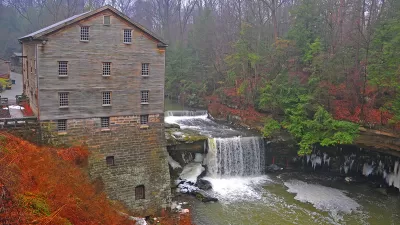Small cities are an asset to the country, so politicians and thinkers on the left and right would do well to stop calling for their inhabitants to flee, Henry Garbar argues in Slate.

Differences in wages and quality of life have people from columnists to President Trump himself asking why people don't just move. "The plight of post-industrial cities like Buffalo, New York, as well as rural communities in Appalachia and the South, is also being dismissed by thinkers on the left and the right," Henry Garbar writes for Slate.
Garbar argues there are good reasons why people are moving less. "This is not as easy as it sounds: Yale law professor, David Schleicher, has laid out three issues that have contributed to Americans’ declining geographic mobility: zoning restrictions that raise housing prices in coastal cities, occupational licensing requirements that make it hard for professionals to cross state lines, and welfare benefits that are difficult to take from place to place," Garbar writes.
How could small cities be saved? Garber points out an idea from Vox's Mathew Yglesias suggesting that moving some government agencies out of D.C. could have a big impact elsewhere, "Time to shift economic activity from the overcrowded coasts to places that need more of it," Yglesias writes. Immigrants and refugees might be motivated to move to these cities. "Michigan Gov. Rick Snyder had earlier discussed getting the Obama administration to offer 50,000 visas for high-skilled migrants to come to Detroit. But Snyder’s plan was dubious—how could you force visa recipients to stay in Detroit?—and the Laitin-Jahr idea was impossible because America hasn’t even accepted one-third that number of Syrian refugees since the war began," Garbar reports.
It's worth the effort though, Garbar contends, not just because small cities serve as a hedge against the troubles larger cities might have in the future, but also because the future prospects of a city can be hard to guess, few predicted New York's comeback in the '80s. What's more, these cities effort distinct advantages. "They’re small enough for regular people to participate in politics and make a mark on civic life; small enough for responsive, local ownership over institutions and infrastructure like banks, broadband, retail, and food production; small enough for short commutes and easy access to nature," Garbar argues.
FULL STORY: In Defense of the Small City

Maui's Vacation Rental Debate Turns Ugly
Verbal attacks, misinformation campaigns and fistfights plague a high-stakes debate to convert thousands of vacation rentals into long-term housing.

Planetizen Federal Action Tracker
A weekly monitor of how Trump’s orders and actions are impacting planners and planning in America.

In Urban Planning, AI Prompting Could be the New Design Thinking
Creativity has long been key to great urban design. What if we see AI as our new creative partner?

King County Supportive Housing Program Offers Hope for Unhoused Residents
The county is taking a ‘Housing First’ approach that prioritizes getting people into housing, then offering wraparound supportive services.

Researchers Use AI to Get Clearer Picture of US Housing
Analysts are using artificial intelligence to supercharge their research by allowing them to comb through data faster. Though these AI tools can be error prone, they save time and housing researchers are optimistic about the future.

Making Shared Micromobility More Inclusive
Cities and shared mobility system operators can do more to include people with disabilities in planning and operations, per a new report.
Urban Design for Planners 1: Software Tools
This six-course series explores essential urban design concepts using open source software and equips planners with the tools they need to participate fully in the urban design process.
Planning for Universal Design
Learn the tools for implementing Universal Design in planning regulations.
planning NEXT
Appalachian Highlands Housing Partners
Mpact (founded as Rail~Volution)
City of Camden Redevelopment Agency
City of Astoria
City of Portland
City of Laramie





























